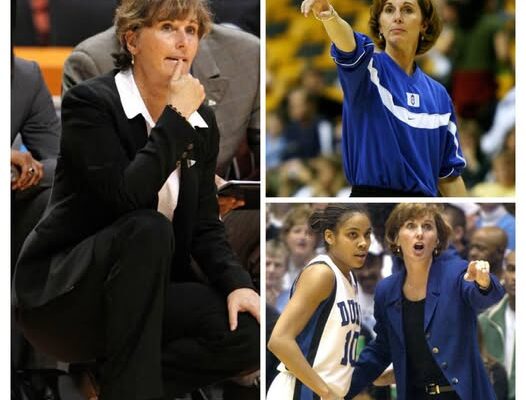When Gail Goestenkors arrived in Durham, North Carolina, to take the helm of the Duke Blue Devils women’s basketball program in 1992, the landscape of women’s college basketball was starkly different from today. Duke wasn’t merely not a powerhouse; it wasn’t even a blip on the national radar. The program had struggled for relevance, overshadowed by more established ACC programs and national titans. Few could have imagined the seismic transformation she was about to orchestrate, a revolution that would fundamentally redefine Duke women’s basketball and cement Goestenkors’s place as one of the most impactful coaches in the sport’s history.
Over the next 15 seasons (she departed after the 2007 season), Goestenkors meticulously built a legacy brick by brick, transforming a struggling program into a perennial national contender. Her tenure was marked by a relentless pursuit of excellence, a keen eye for talent, and a coaching philosophy that blended disciplined fundamentals with an exciting, uptempo style of play. And in the 2001-2002 season, it all reached a historic high, culminating in a defining moment that showcased the culmination of her vision and hard work.
Goestenkors’s initial years at Duke were about laying a solid foundation. She instilled a culture of hard work, accountability, and a commitment to academic excellence. Her recruiting efforts were tireless, targeting not just talented athletes but intelligent, driven young women who would thrive in Duke’s rigorous academic environment. She started by attracting regional talent and gradually expanded her reach, convincing elite national prospects that Duke could offer both a world-class education and a path to national championship contention.
The program’s ascension wasn’t immediate, but it was steady. After a few rebuilding seasons, Goestenkors led Duke to its first NCAA Tournament appearance in 1996. The breakthrough came in 1999 when the Blue Devils, led by stars like Michele Van Gorp and Nicole Erickson, made a stunning run to the NCAA Championship game, ultimately falling to Purdue. This performance signaled Duke’s arrival on the national stage and served as a powerful recruiting tool, demonstrating that Goestenkors had built a program capable of competing with the very best.
The 2001-2002 season was the true apotheosis of Goestenkors’s efforts. The team she assembled was a perfect blend of seasoned veterans and burgeoning young stars, showcasing the depth and talent she had cultivated. Key players included:
- Alana Beard: A sophomore sensation who was rapidly emerging as one of the nation’s most dominant all-around players. Beard was a force on both ends of the floor, combining elite scoring with tenacious defense.
- Monique Currie: A talented freshman who immediately made an impact with her athleticism and scoring ability.
- Iciss Tillis: A versatile forward who provided scoring, rebounding, and interior defense.
- Michele Matyasovsky & Corresponding Seniors: Providing critical leadership and experience.
Under Goestenkors’s guidance, this team achieved unprecedented success. They finished the regular season with an incredible 31-4 record overall and a perfect 16-0 mark in the ACC, capturing their third consecutive ACC regular-season championship. They were a dominant force, known for their suffocating defense, balanced scoring attack, and relentless fast break. The perfect ACC record was a monumental achievement, reflecting their supremacy within one of the toughest conferences in the nation.
The culmination of their regular-season dominance came in the ACC Tournament. The Blue Devils swept through the tournament, securing their third consecutive ACC Tournament title. This level of consistent success within the conference solidified their status as a national elite.
However, the defining moment of the 2001-2002 season, and a testament to Goestenkors’s tactical brilliance and the team’s resilience, came in the NCAA Tournament. Duke earned a No. 1 seed for the first time in program history. They navigated through the early rounds with relative ease, showcasing their depth and talent. The regional final, however, presented a formidable challenge against the legendary Connecticut Huskies, led by Geno Auriemma.
While the Blue Devils ultimately fell to UConn in a hard-fought game that year, the significance of their journey to the Elite Eight, their No. 1 seed, and their overall dominance cannot be overstated. It was the highest point of achievement for the program up to that point, proving that Duke wasn’t just a flash in the pan but a legitimate, consistent national championship contender. That year’s team laid the groundwork for future deep tournament runs, including another NCAA Championship game appearance in 2006.
Gail Goestenkors’s legacy at Duke extends far beyond the win-loss record, impressive as it was (399-99 overall, 169-47 in ACC play). She left behind a program fundamentally transformed:
- National Prominence: She put Duke women’s basketball on the national map, turning it into a destination program for elite recruits.
- ACC Dominance: Her teams won five ACC Tournament championships and five ACC regular-season championships, establishing a new standard of excellence within the conference.
- NCAA Tournament Consistency: Under her leadership, Duke made 13 consecutive NCAA Tournament appearances, including four Final Fours (1999, 2002, 2003, 2006) and two NCAA Championship game appearances (1999, 2006).
- Player Development: She recruited and developed numerous All-Americans and future WNBA players, including Alana Beard, Monique Currie, Iciss Tillis, and Lindsey Harding. She fostered not only athletic talent but also strong character and academic success.
- Coaching Tree: Her coaching tree branched out, with many of her former assistants and players going on to successful coaching careers themselves.
- Breaking Barriers: She consistently challenged the traditional power structure of women’s college basketball, proving that a program could be built into a national force even without decades of existing tradition.
Goestenkors’s departure from Duke in 2007 for the University of Texas was a significant moment, but her impact on the Blue Devils program was irreversible. She didn’t just win games; she built a culture, nurtured talent, and instilled a belief that Duke women’s basketball could compete with anyone, anywhere. The 2001-2002 season stands as a brilliant monument to her vision and the historic peak of her transformative work, a testament to the coach who truly changed Duke forever.



